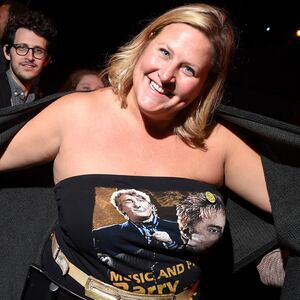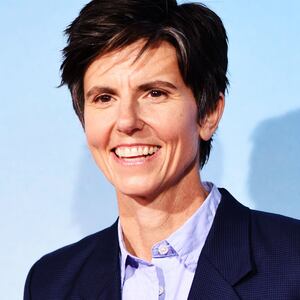With her raucous cabaret act, Bridget Everett has never been shy about putting all of herself out there for audiences to enjoy. But in her new semi-autobiographical series Somebody Somewhere, which HBO just renewed for a second season, she is laying herself bare on a whole new level.
In this week’s episode of The Last Laugh podcast, Everett opens up about the real-life trauma that helped inform her revelatory performance, what she learned about being “relatable” from a previous pilot that didn’t get picked up, and dishes on what it was like to get back on stage for the first time in two years. She also shares hilarious stories about being cast in the Sex and the City movie, meeting her friend Amy Schumer for the first time, and getting in the middle of an epic feud between Jerry Seinfeld and Bobcat Goldthwait.
Despite earning nearly universal critical raves, Everett admits she felt “a little uncertain at first” about Somebody Somewhere, “because it’s a show that kind of wears its heart on its sleeve and that’s not always considered cool.” The low-key exploration of life by a group of mostly queer outsiders in her conservative hometown of Manhattan, Kansas, aka “the Little Apple,” is a far cry from the sweaty, booze-soaked bonanzas that Everett had been putting on for years at Joe’s Pub in the Big Apple—until the pandemic made her style of up close and personal cabaret nearly impossible.
“I’m not gonna lie, I became really, really depressed about it,” she says of her long hiatus from the stage. “The live stage show is the juice, it drives me, it makes me very happy.” So instead of trying to recreate her onstage persona on screen, she asked herself, “What if Bridget Everett never moved to New York and stayed in Kansas?”
“I had never thought about doing a show back in Kansas. I’d left for a reason,” she tells me. “But honestly it’s been really fun and cathartic and healing in a way to do a show back in Kansas.” And though the series is full of deeply personal details about her family, including her sister’s death and her mother’s alcoholism, she insists, “This is not like a hit piece on my family. I’m not coming for them. Because they would not fucking have it if I did.”
Everett says Somebody Somewhere, which was co-created by High Maintenance alums Hannah Bos and Paul Thureen, is really about “finding your people” and “re-engaging with the world” after losing a loved one. “And for me, those themes are present in my real life,” she says. “I’m a wildebeest on stage, but in real life I’m an introvert who’s sad a lot, which isn’t very interesting, but it’s true.”
“When I was younger, I was always getting in trouble for being a little too foul-mouthed or a little too obnoxious or a little too wild,” Everett adds. But the “bigger and wilder” she got on stage, the more she felt like she “had to protect” her “real” self by becoming more withdrawn and even reclusive at times. “Because I share quite a bit on stage, both emotionally and physically. And I mean that from the heart to the tits,” she says. “You sort of leave it all on the floor. And so then I just need to go home and sit with myself.”
Everett’s character, Sam, begins Somebody Somewhere without the emotional outlet of the stage and only starts to open up as she begins performing songs as part of the town’s underground queer-friendly “choir practice” nights. The actress says it wasn’t hard to put herself back in that mindset, because “there was a very long span” of her life when no one was giving her an opportunity to sing in public.
“The only real singing I was doing in my twenties and thirties was in karaoke bars,” she says. “And then in my late thirties, I found cabaret and started getting a little more successful at it. But there were many years when I was here in New York and my friends were becoming successful on Broadway and TV and movies and I was still a waitress. And there’s nothing wrong with that, but if that’s not your dream, it’s going to leave you a little empty.”
Everett was a “karaoke queen” once a week and when she didn’t get to perform, she recalls, “I was just angry. I was a mean friend and a little lost. I know a lot of people that are in their thirties and forties and not quite connecting to the thing it is that they really want to do, or not finding a way to do it, or not fully giving themselves a chance to do it. And you certainly don’t see a lot of women pushing 50 that are protagonists trying to just start their life at that age.”
Somebody Somewhere is actually Everett’s second shot at television success. About five years ago, she made a pilot for Amazon Prime Video with Sex and the City creator Michael Patrick King called Love You More. At the time, Amazon was having viewers vote on their pilots to see which ones would get picked up to series, and Everett says her show was the “most popular” one on the slate by that measure.
“And then they just took it to a focus group and a couple guys were like, ‘We don’t think she’s relatable,’” Everett recalls. “I was like, oh, OK, maybe I’m not relatable. I guess there goes my shot and it’s over.”
“We might have been a casualty of war,” she says with a sardonic laugh about Amazon’s particularly toxic culture during that period, which also led to the premature cancellation of beloved series like Tig Notaro’s One Mississippi and Joey Soloway’s I Love Dick.
Instead of walking away from that experience thinking she should try to be more “relatable,” Everett ran in the other direction, realizing that “the more specific I am to me and the more true I can be to my story,” the more viewers will connect with her work.
“And at the end, I was like, ‘Fuck, this is kind of a tender and sweet show. Is this going to not be cool and just fade away, just slip into the darkness?’” she says. But she knew that ultimately she had put all of herself into Somebody Somewhere. “And if it failed, it failed, but at least I gave it everything that I had.”
Just before the Omicron wave crashed into New York City, Everett got the chance to perform live for the first time in nearly two years at Joe’s Pub. “It felt like being in an electric car, being drained down to zero and then going to get a supercharge and all of a sudden you’re just buzzing,” she says with a smile. At the same time, she admits, “I was really scared for the first five minutes. I thought I’d lost it. And then I sang ‘Titties,’ which is a real crowd-pleaser and it snapped me right back into place.”
“I was scared to be near anybody for a number of reasons, really. But the people in the audience were just like, ‘Bring it on!’” she continues. “Everybody was so in need of connection and in need of the thrill of it. I took out a lot of the audience participation. I scaled it back probably 70 percent, just for everybody's sanity. But I’ve never felt an audience as I did in that week, like they needed as much as I did.”
In the years since Everett started performing her stage show, during which she will frequently shove audience member’s heads into her chest or straddle their faces mid-song, attitudes about consent have evolved. And she has tried to evolve with them.
“I’ve changed the language in the show. I don’t go near people as much. I say, ‘May I?’” she explains. “We’re all learning as we go. It can’t be as haphazard as it used to be. And it shouldn’t be. Let’s ride with the times and learn and grow and make sure everybody’s comfortable and happy.”
At the same time, pretty much everyone who comes to see Everett live knows what they’re in for. “They’re there for a reason,” she says.
Listen to the episode now and subscribe to ‘The Last Laugh’ on Apple Podcasts, Spotify, Google, Stitcher, Amazon Music, or wherever you get your podcasts, and be the first to hear new episodes when they are released every Tuesday.



